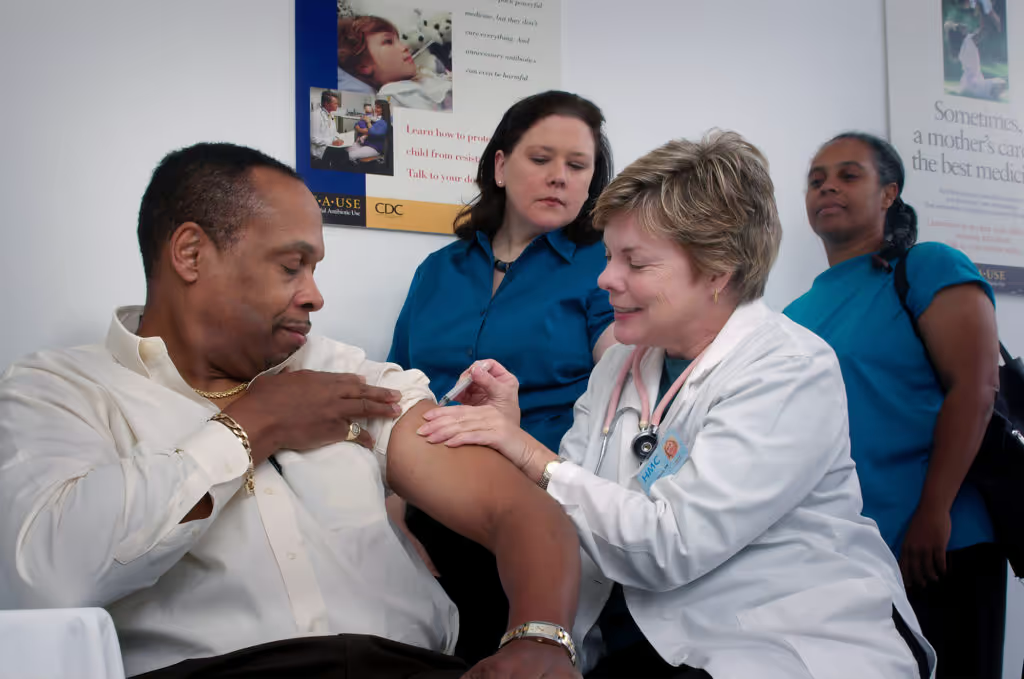How to get the required vaccinations or file for an exemption
As you may already know, applying to immigrate to the United States requires a medical examination with a USCIS certified doctor. To learn more about this medical examination and it’s Form I-693, Report of Medical Examination and Vaccination Record, read our article here. It serves as a precursor to this article.

Part of the medical examination requires doctors to check that you are up-to-date on all vaccinations designated as mandatory by USCIS and CDC. This article provides information about the basic vaccination requirements for those hoping to immigrate to the United States as well as describes what actions are required to opt-out of these requirements. For further information on vaccination requirements, check out some of the FAQ’s on the USCIS website.
Overview
Which vaccinations are required?
Under US immigration law, all immigrants, including those seeking permanent resident status, are required to receive vaccinations to prevent the following diseases:
- Haemophilus influenza type B
- Hepatitis B
- Measles
- Mumps
- Pertussis
- Polio
- Rubella
- Tetanus and Diphtheria Toxoids
- Any other vaccine-preventable diseases recommended by the Advisory Committee for Immunization Practices
- Influenza
- Rotavirus
- Hepatitis A
- Meningococcal disease
- Varicella
- Pneumococcal disease
The influenza vaccination requirement is unique in that it is only required during the flu season since it is strain-specific and only available for a limited time each year. For the purposes of the Form I-693, the flu season is considered to be from October 1st - March 31st. If applying during this window, the influenza vaccination is required.
Effective Jan 22, 2025, applicants subject to the immigration medical examination no longer need to be vaccinated against COVID-19 before the civil surgeon can complete an immigration medical examination and sign Form I-693, Report of Medical Examination and Vaccination Record.
Going to your appointment
You should bring the following items with you:
- Official vaccination or immunization record.
- Form I-693, Report of Medical Examination and Vaccination Record. Print out and bring the form to your appointment. Fill out Part 1 of the form but do not sign it until the civil surgeon tells you to do so.
- Government-issued I.D., such as a valid passport or driver’s license.
- Medical insurance card. Check with the doctor’s office to see if they accept your medical plan.
- Payment. Check with the doctor’s office about acceptable forms of payment
Remember to bring your up-to-date vaccination history with you to your appointment.
If you have lost or misplaced your vaccination history, contact your doctor or public health clinic to see if they have a copy. You can also contact your state’s health department if you are living in the United States to see if they keep vaccination records. For children, check with previous schools or daycares as they may have a copy as well.
Vaccination Assessment
During your appointment, the civil surgeon or panel physician will review your vaccination history with you to determine whether or not you have received all of the required vaccinations. This is why it is so important to remember to bring an official record of your vaccination history with you to your appointment. The results of this evaluation will be recorded on your Form I-693.
If you are up to date on the required vaccines, no additional vaccines will be required at the time of the medical exam.
If you do not have the required vaccinations
If you are not up-to-date on all of the required vaccinations, don't worry! The civil surgeon or panel physician can often provide them and can help you determine which ones are appropriate for you. You also have the option to ask your family doctor to administer the required vaccines to you after your evaluation. If you choose the latter option, you will need to show the records of these vaccinations to the civil surgeon or panel physician to note on Form I-693 in order to complete the form prior to submitting it to USCIS.
Additionally, some of the required vaccine series require months to years to complete. This can make it difficult for applicants to receive all required vaccinations prior to adjustment of status or immigration. For many of these USCIS only requires that you have at least one dose of each age-appropriate vaccination listed as mandatory.
Talk to your doctor before you get vaccinated
Some people may not be able to get vaccinated — or may need to wait.
The day of your appointment, tell your doctor if you:
- Have any allergies
- Have had serious side effects from a vaccine in the past
- Are pregnant or planning to get pregnant
- Are sick
Vaccination Costs
While USCIS does not charge a filing fee for Form I-693, fees for the medical examination are set and charged by the doctor administering the test. Usually these examination fees range from $100 to $500. You can shop around to find the best price. In addition to the examination fee, you will also need to pay for any additional vaccinations needed to meet USCIS requirements.
As can be expected, the costs of these vaccinations will depend largely on how many and which vaccinations you need. It will also depend on the country in which you are getting vaccinated, the clinic you are attending, and what type of health-insurance you have. You can expect to pay anywhere from $25-$150 for each vaccination before insurance is factored in. Clinics often list which vaccinations they carry and how much they charge, so feel free to shop around for the best price!
Vaccination Exemptions
There are a wide variety of reasons why someone may not have or may not wish to receive certain vaccinations.
Individuals can be exempted from immunization requirements for reasons such as age, health, pregnancy, as well as their moral convictions and religious beliefs. To find a more detailed list of potential exemptions, check out this list from the USCIS.
Blanket Waiver - “Not Medically Appropriate” exemptions
Some people qualify for something called a “Not Medically Appropriate” exemption, often referred to as a blanket waiver. According to the USCIS website, this applies to:
- Vaccinations that would not be safe to receive due to a medical condition such as pregnancy, allergies, or a previous bad reaction to that vaccine.
- Vaccinations that are not required based on the applicant’s age at the time of the medical exam.
- Vaccinations that are administered as a series in intervals, but there is insufficient time to complete the entire series at the time of the medical examination. (The individual is often required to have at least the first round of the series)
- The influenza vaccine if it is not the flu season.
If you meet one or more of these criteria, the civil surgeon or panel physician will indicate this on the Form I-693 and USCIS can then waive that requirement.
A separate waiver application is not required for these specific exemptions. In other words, no additional form is needed for an officer to grant a blanket waiver for the vaccination requirement.
To learn more about vaccination requirements for pregnant women, see the CDC’s "Guidelines for Vaccinating Pregnant Women" page. For more detailed information regarding age-specific vaccinations, check out the CDC’s information on age requirements.
Moral or Religious Exemptions
For exemptions that do not meet the “Not Medically Appropriate” criteria, an individual must file a separate waiver application. This specifically applies to those who object to required vaccinations because of sincerely held moral convictions or religious beliefs. The required waiver is Form I-690, Waiver of Grounds of Inadmissibility. If you plan to apply for this waiver, inform your civil surgeon or panel physician.
Please note that I-690s have a higher rejection rate. If denied, USCIS will require you to complete the medical exam which could delay the approval of your case.
Form I-690, Waiver of Grounds of Inadmissibility
What is it?
This form is used to apply for a waiver of inadmissibility. It can be used by applicants for a number of reasons, including to waive the vaccination requirements. This waiver of the vaccination requirement is specific to those who wish to be exempted due to moral convictions or religious beliefs. For additional information on this form and its potential uses, refer to this USCIS web page. This link also provides you access to the PDF version of form I-690.
Cost
As of March 2025, the filing fee for this waiver form is $905.
Waiver Requirements for Vaccination Exemptions
USCIS, in consultation with CDC, has established the following requirements that an applicant has to demonstrate through documentary evidence to qualify for this exemption:
- The applicant must be opposed to all vaccinations in any form. They cannot pick and choose which vaccinations they want. However, it is important to note that having some vaccinations but not others does not automatically result in the denial of the waiver. The officer should consider the reasons provided for getting certain vaccines and not others such as whether the individual’s moral convictions or religious beliefs have changed substantially since the date the vaccinations were given.
- The objection must be based on religious beliefs or moral convictions.
- The religious belief or moral conviction must be sincere. The focus of the waiver adjudication will be largely based on whether or not you can demonstrate that the religious belief or moral conviction is consistently applied in your life. This strict adherence is considered to be distinct from mere preference.
Evidence
Evidence of these religious beliefs or moral convictions may be established in two primary ways:
- Through the applicant’s sworn statement
- Through additional evidence that supports that sworn statement
The minimum requirement is that you include a personal statement describing the reasons behind your objection. Make sure you include enough information in your statement to adequately demonstrate that you meet the three criteria listed above.
An example of supporting evidence would be providing evidence of regular participation in a congregation by submitting affidavits from congregation members or evidence of regular volunteer work.
How to File Form I-690
When you file this form you must submit all evidence and supporting documentation required. You will also need to include the filing fee of $905.
Fill Out On a Computer
Download and view in a PDF viewer.
Print & Fill Out Paper Form
Print the PDF and fill by hand with black pen.
Hire a Legal Professional
Find a legal professional to complete the form.
Have questions about Vaccination Requirements and Exemptions?
For additional information on your medical examination and form I-693, refer to our article How to Complete a Medical Examination.
If you need help or have questions about vaccination requirements, exemptions, or Form I-690, please reach out to our team and we’ll get back to you shortly.
Related
Frequently Asked Questions
Articles
Begin Your Immigration Journey Today with SimpleCitizen!
Why spend more time and money on countless legal headaches, when you could just use SimpleCitizen and focus on what matters most – being with those you love! Find new opportunities, start new adventures, and bring your family together with SimpleCitizen today!

